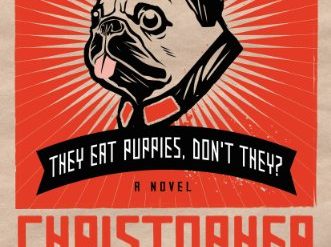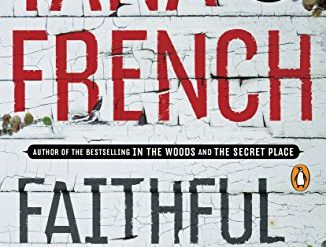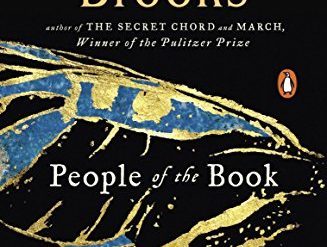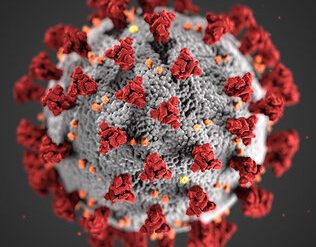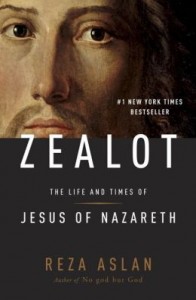
Estimated reading time: 16 minutes
Only when I glanced through the archives of this blog did I realize that I’d read and reviewed so many excellent books about Jews and the Jewish experience. Though I’m not observant, I was raised in the faith and still identify myself as Jewish, and I probably pay more attention to the news from Israel and the Middle East than the average bear. Below, then, in alphabetical order by author’s surname, are more than 25 worthy books about Jewish topics that I’ve read in recent years, with links to my reviews. I recommend them all.
This post was updated on March 7, 2024.
Zealot: The Life and Times of Jesus of Nazareth, by Reza Aslan
Leave it to a Muslim to strip away the myth and fantasy that define Christianity and paint a picture of Jesus of Nazareth set squarely in the reality he experienced. Reza Aslan, Iranian refugee in America, fundamentalist Christian turned Muslim, brilliant scholar of comparative religion, gives us Jesus as he really was . . . READ MORE
Anatomy of a Genocide: The Life and Death of a Town Called Buczacz by Omer Bartov
By tracing the history of antisemitism in a single Polish-Ukrainian town from the sixteenth century to the present, and detailing day by day how the Holocaust unfolded there, he brings to light the many nuances lost in historical portraits painted with a broader brush. READ MORE
The Postcard by Anne Berest
The story of a Russian Jewish family’s saga of flight through four countries until they remade their lives in France in the 1920s and 30s, only to be caught up in the Holocaust as World War II arrived to shatter their lives. READ MORE
“The Rest of Us”: The Rise of America’s Eastern European Jews by Stephen Birmingham
Some of the most remarkable figures in the history of the United States during the first half of the twentieth century were first- or second-generation Jews who had emigrated from the Russian Empire. The social historian Stephen Birmingham (1929-2015) told their colorful story in “The Rest of Us” more than forty years ago. But his account remains as lively and engaging as ever today. If you want to understand the history of Jews in America, this is the place to start. . . READ MORE
People of the Book, by Geraldine Brooks
Pulitzer-Prize-winning author Geraldine Brooks will carry you on the eloquence of her prose through the five-century journey throughout Southern Europe of the fabled Sarajevo Haggadah . . . READ MORE
The School that Escaped the Nazis: The True Story of the Schoolteacher Who Defied Hitler by Deborah Cadbury
Cadbury’s book relates the history of a remarkable progressive school founded in Germany in 1926 under the name Landschulheim Herrlingen. Once the Nazis came to power in 1933, the fiercely determined cofounder, Anna Essinger (1879-1960), stealthily moved the staff and students to a manor called Bunce Court in Kent on the southern coast of England. There it became a haven for hundreds of Jewish children fleeing the Third Reich. The school remained in operation until 1949. READ MORE
The Yiddish Policemen’s Union by Michael Chabon
The author of The Amazing Adventures of Kavalier and Clay ventures into science fiction with this alternate history of the Jewish people. He answers the question, what would have happened if the Jews had lost the Israeli War of Independence. . . READ MORE
The Fish That Ate the Whale: The Life and Times of America’s Banana King, by Rich Cohen
He was the guy who engineered the CIA-led coup that overthrew the government of Guatemala in 1954, ushering in an era of intensified hatred for the United States throughout Latin America. He was also pivotal in the early history of Israel — as Chaim Weizmann’s favorite donor in America, as the man who pulled strings to force the release of the ship Exodus from the Port of Philadelphia and send it on its way to Israel . . . READ MORE
The German Girl by Armando Lucas Correa
In this moving tale of the Holocaust loosely based on historical fact, the “German girl” is Hannah Rosenthal, the blonde, blue-eyed, 11-year-old daughter of a wealthy and prominent Jewish family in Berlin who is “more German” than her non-Jewish neighbors. . . READ MORE
The Jews in America by Max I. Dimont
This celebrated history of Jews in the United States covers the three waves of immigrants who formed today’s large Jewish population (Portuguese, German, and Russian), the three predominant sects (Orthodox, Conservative, and Reform), and the profound influences on Jewish faith and practice of both Protestant congregationalism and the European enlightenment. . . READ MORE
The Unwanted: America, Auschwitz, and a Village Caught in Between by Michael Dobbs
Dobbs argues persuasively that the United States admitted more German Jewish refugees than any other country (except the territory of Palestine). Although FDR declined to increase the immigration quota to accept even more refugees, it was strictly because he recognized that Congress would have cut back the numbers. . . READ MORE
The Jews: Story of a People by Howard Fast
An eminently readable, 5,000-year history of the Jewish people by one of the twentieth century’s most prolific novelists. His account is full of surprises . . . READ MORE
The Oppermanns by Lion Feuchtwanger
Feuchtwanger was one of Germany’s most successful novelists when he wrote this book in 1933 in Berlin. He published it later that year in Amsterdam while in exile in France. It’s the story of three prosperous German-Jewish brothers as they observe the rise to power of the Nazis in 1932 and 1933. . . READ MORE
The List, by Martin Fletcher
The story of one young refugee Jewish family in London in 1945 brings home the chilling reality of the Holocaust more powerfully than any recitation of the numbers of Hitler’s victims could ever possibly do . . . READ MORE
Man’s Search for Meaning by Viktor E. Frankl
In the course of more than three years in a succession of four Nazi concentration camps, including Auschwitz, a young Viennese psychiatrist reaches the conclusion that “Life is not primarily a quest for pleasure, as Freud believed, or a quest for power, as Alfred Adler taught, but a quest for meaning.” . . . READ MORE
Spies of No Country: Secret Lives at the Birth of Israel by Matti Friedman
Friedman’s book tells the tale of four young Arab-speaking Jewish men who became spies for the scattered forces working to establish the State of Israel. They had emigrated to join Jewish settlements in Palestine from their homes in Damascus, Aleppo, Arab-occupied Jerusalem, and Yemen. They were, in a word, Asian Jews, like millions of others who later fled the towns and cities of the Middle East and North Africa following Israel’s declaration of independence in 1948. . . READ MORE
Israel: A Concise History of a Nation Reborn by Daniel Gordis
Few subjects are more likely to set off heated arguments among American Jews than the actions of the State of Israel. Since the country claimed its independence in 1948, Israel’s wars and its relations with the Palestinian Arabs who live inside its disputed borders have accounted for more tears and broken families than even the most controversial questions in America’s own polarized politics. How remarkable it is, then, that a Jewish historian, born in the United States but living now in Jerusalem as an Israeli citizen, could write a history of his adopted country that those with wildly differing views might find balanced and fair. Which explains how Israel: A Concise History of a Nation Reborn by Daniel Gordis was the Jewish Book of the Year in 2016, the most prestigious of the year’s National Jewish Book Awards. . . READ MORE.
We Must Not Think of Ourselves by Lauren Grodstein
During the two years before the liquidation of the Warsaw Ghetto in May 1943, a small group of Jewish scholars, diarists, and journalists recorded their stories and those of their families, friends, and neighbors in the Oneg Shabbat Archive. Although only a portion of their work survived the war, it’s enough to render a vivid picture of the growing desperation, and the heroism, of the men, women, and children imprisoned there before the Nazis took their lives. READ MORE.
The Last Jews in Berlin by Leonard Gross
When we consider the fate of the Jews in Europe during the Nazi years, our thoughts tend to drift toward stereotypical images. The gas chambers at Auschwitz and other death camps. And doomed Anne Frank cooped up in hiding for two years until she was betrayed. Both images are accurate, as they reflect the experience of millions of European Jews. But there were exceptions, and their experiences tell us a great deal about life in Nazi-dominated Europe. Author Leonard Gross does an excellent job conveying the alternate reality they represented in The Last Jews in Berlin. Yes, it’s true. Jews survived the Holocaust in Berlin. READ MORE.
The House by the Lake: One House, Five Families, and a Hundred Years of German History by Thomas Harding
Much of The House by the Lake is dominated by the saga of the author’s family of prosperous, assimilated Jews, who built a vacation home on the shores of a lake near Berlin in 1927. The house they built became home to a succession of four other families in the decades following their flight from Nazi Germany in 1934. In many ways, the story of this house must resemble what took place in other homes from which German Jews fled or were seized and shipped off to the death camps. . . READ MORE
An Officer and a Spy by Robert Harris
Robert Harris’ gripping fictional treatment of the Dreyfus Affair helps illustrate just how deeply antisemitism was entrenched in Europe long before Adolf Hitler came to power. This tragic episode spanned more than a dozen years around the turn of the 20th Century, and it took place in France, not Germany. In fact, antisemitism was widespread throughout the Continent and had flared up in violent ways for well over a thousand years before World War II. . . READ MORE
Hell’s Cartel: IG Farben and the Making of Hitler’s War Machine, by Diarmuid Jeffreys
In 1965, just twenty years after the collapse of the Nazi regime, I visited Auschwitz. Even though that was nearly half a century ago, my memory of that shattering experience remains vivid . . . READ MORE
The Accomplice by Joseph Kanon
On May 11, 1960, SS–Obersturmbannführer Adolf Eichmann was captured by the Mossad in Argentina. Eichmann had been one of the principal planners behind the Nazis’s “Final Solution.” Later, in Israel, he was found guilty of war crimes in a widely publicized trial and executed by hanging in 1962. Meanwhile, other notorious Nazi war criminals, including Josef Mengele and Klaus Barbie, were the subjects of intensive searches elsewhere in South America. And thriller author Joseph Kanon writes about a similar effort, hunting for Nazis in Argentina, in a brilliant new novel, The Accomplice. . . READ MORE
The Last Kings of Shanghai: The Rival Jewish Dynasties That Helped Create Modern China by Jonathan Kaufman
Ever since the close of World War II eight decades ago, stories have been surfacing about heroic men and women who saved Jews from certain death in the Holocaust at great risk to their own lives. Names such as Oskar Schindler, who saved 1,200, and Raoul Wallenberg, who saved several thousand, routinely crop up in the pages of history. In fact, Yad Vashem, Israel’s Holocaust museum, recognizes more than 26,000 “individuals and groups from 44 countries” as Righteous Among the Nations for similar acts. In Shanghai, two businessmen who helped build modern China deserve equal mention. READ MORE
The Ritual Bath (Peter Decker and Rina Lazarus #1), by Faye Kellerman
In the first of her long-running series of detective novels, Faye Kellerman takes readers inside a Los Angeles yeshiva, introducing religious practices unfamiliar to most American Jews . . . READ MORE
Odessa: Genius and Death in a City of Dreams by Charles King
The historic Ukrainian port of Odessa, with its roots in the reign of Catherine the Great, was the site of the first and greatest pogroms in the history of the Russian Empire. But in the Holocaust, it was Romanian troops, not German, who eliminated the city’s Jewish population. . . READ MORE
In the Garden of Beasts: Love, Terror, and an American Family in Hitler’s Berlin, by Erik Larson
In the years 1933-41, a passion for isolationism and growing anti-Semitism gripped the American psyche, keeping President Roosevelt from speaking out against the growth of Nazism and the ever-tightening vise of oppression and violence directed at Germany’s tiny Jewish minority (about one percent of the population) . . . READ MORE
The Oracle of Stamboul by Michael David Lukas
This novel is sheer reading pleasure. From the very first page, The Oracle of Stamboul will draw you relentlessly into the world of the Ottoman Empire in its twilight years of the 1880s. You’ll meet an extraordinary child, Eleanora Cohen, and you’ll be present with her from the violence of her birth in Rumania through her ninth year in Istanbul (then Stamboul) as the unlikeliest of advisers to the Sultan. . . READ MORE
The Debba, by Avner Mandelman
I’ve often wondered how the current intractable standoff between Israelis and Palestinians came about. “It’s obvious, you’ll say. “Jewish immigrants from Europe settled on Palestinian land,” and of course that’s true. But doesn’t it seem unlikely that every Israeli became an Arab-hater shortly after arriving, and every Arab a Jew-hater just as quickly? . . . READ MORE
The Glass Room by Simon Mawer
This haunting historical novel is centered around the experiences of the Czech-Jewish Landauer family, their servants, and friends from 1938, when the Nazis seized power in Prague, through the end of World War II in 1945. . . READ MORE
The Heaven and Earth Grocery Store by James McBride
In his newest novel, The Heaven and Earth Grocery Store, McBride journeys three-quarters of a century into the depths of the Great Depression to a place in eastern Pennsylvania called Pottstown. McBride spins a tale of the Jews and African Americans living together there. They share the disdain and discrimination of the white town fathers whose forebears immigrated before them. As the reviewer for the New York Times notes, it’s “a murder mystery locked inside a Great American Novel.” READ MORE
The Tattooist of Auschwitz by Heather Morris
The Tattooist of Auschwitz, set largely in the death camp itself, offers a fictionalized picture of life there from 1942 until the end of World War II. The book is a novel. Yet it is squarely based on the real-life experiences of “Lale” Eisenberg, a young Slovak Jew who was transported to Auschwitz in April 1942 . . . READ MORE
From Kraków to Berkeley: Coming Out of Hiding by Anna Rabkin
A daughter of a Polish-Jewish family born in 1935 reflects on her life as a child hiding out from the Nazis and the seven decades that followed in an eventful life spanning three continents. . . READ MORE
The Last Jew of Treblinka by Chil Rajchman
An escapee from the notorious Treblinka death camp recounts his experience there in 1942-43, before he participated in the revolt that led the Nazis to shut down the camp. . . READ MORE
The Girl from Krakow by Alex Rosenberg
A novelist examines the impact of the Second World War from the perspective of a young woman and a young man, both of them Jews born in Poland in the aftermath of World War I. The story spans the last years of the 1930s until the early postwar years as the Russians and their Western Allies divided up the spoils of the Continent. . . READ MORE
Survivor Café: The Legacy of Trauma and the Labyrinth of Memory by Elizabeth Rosner
A novelist and poet set out to understand the impact of her parents’ experiences in World War II on her own life and found herself exploring the controversial phenomenon of epigenetics, “the study of environmentally induced changes passed down from one generation to the next.” . . . READ MORE
The Sassoons: The Great Global Merchants and the Making of an Empire by Joseph Sassoon
They were one of the world’s richest families for nearly a century, with a fortune built on trading opium. They dominated trade in Asia for decades in the 19th century. This is the story of their rise and fall. . . READ MORE
My Promised Land: The Triumph and Tragedy of Israel, by Ari Shavit
It would be difficult to find anyone better informed or better positioned to write this wide-ranging assessment of Zionist history, Israel’s internal politics, and the country’s strategic position in the region than Ari Shavit. A long-time columnist for Haaretz, Israel’s oldest daily newspaper, and a contributor to The New Yorker, Shavit is a fourth-generation Israeli, a great-grandson of one of the founders of the Zionist project . . . READ MORE
The Book of Aron by Jim Shepherd
In 1942, in the months leading up to the doomed Warsaw Ghetto uprising, the thirteen-year-old son of a poor Jewish couple from a Polish shtetl is forced to take extreme measures to survive as the Nazis progressively shrink the borders of the Ghetto and starve its residents. . . READ MORE
Spies in Palestine: Love, Betrayal, and the Heroic Life of Sarah Aaronsohn by James Srodes
In the closing years of World War I, an extraordinary young Jewish settler in Palestine played a pivotal role in helping the British defeat the Turkish Empire in the region. Her courage helped lay the foundation for the State of Israel in the years ahead. . . READ MORE
Little Failure: A Memoir, by Gary Shteyngart
Little Failure is hilarious, but it’s a lot more than that: it’s brutally honest — often with an emphasis on brutality — and no one, least of all Shteyngart himself, escapes unscathed. It would be difficult to pigeonhole this memoir as the tale of an immigrant growing up in New York, or of the Jewish experience, or of a boy’s coming-of-age late in the 20th Century. Gary Shteyngart is sui generis . . . READ MORE
I Escaped from Auschwitz by Rudolf Vrba and Alan Bestic
This 1963 memoir is arguably the most important Holocaust memoir ever written. It was based on the author’s 1944 eyewitness report from Auschwitz that reached the desks of Winston Churchill and Franklin Roosevelt and became the basis for spectacular stories in the New York Times and the BBC . . . READ MORE
In the Name of Humanity: The Secret Deal to End the Holocaust by Max Wallace—How the Holocaust ended
The Holocaust didn’t end only with the Allied defeat of Nazi Germany in May 1945. Because in November 1944 Heinrich Himmler stop the killing in all the death camps. Three remarkably outsiders convinced him to do so. . . READ MORE
1944: FDR and the Year That Changed History by Jay Winik
A historian reveals how “the State Department was now using the machinery of government to prevent, rather than facilitate, the rescue of the Jews” from the Holocaust. . . READ MORE
Pogrom: Kishinev and the Tilt of History by Steven J. Zipperstein
Stanford history professor Steven Zipperstein does a masterful job recreating the scene of what became the anti-Semitic riot that came to be identified with the word pogrom for Jews the world over for decades. Although there were fewer than 200 casualties, the Kishinev Pogrom became the subject of headline-grabbing press reports around the world and of an epic poem considered one of the finest works of Jewish literature of the 20th century. . . READ MORE
I’ve also read and reviewed Simon Schama’s The Story of the Jews: Finding the Words, 1000 BC – 1492 AD, which appears to have been derived from the historian’s series of the same name for the BBC. I found the television version more rewarding.
For related reading
You might also check out The War Girls by V. S. Alexander (Life in wartime Warsaw before the Ghetto Uprising), although the book doesn’t rate being added to the list above.
You might also be interested in:
- 15 good books about the Holocaust
- 5 top nonfiction books about World War II
- 20 top nonfiction books about history
- Top 20 popular books for understanding American history
And you can always find my most popular reviews, and the most recent ones, on the Home Page.


